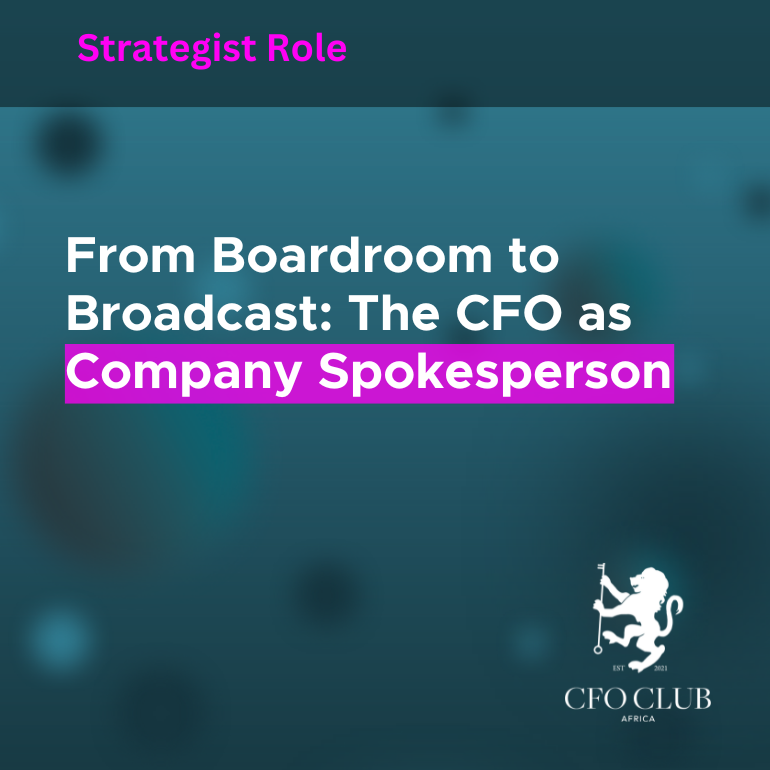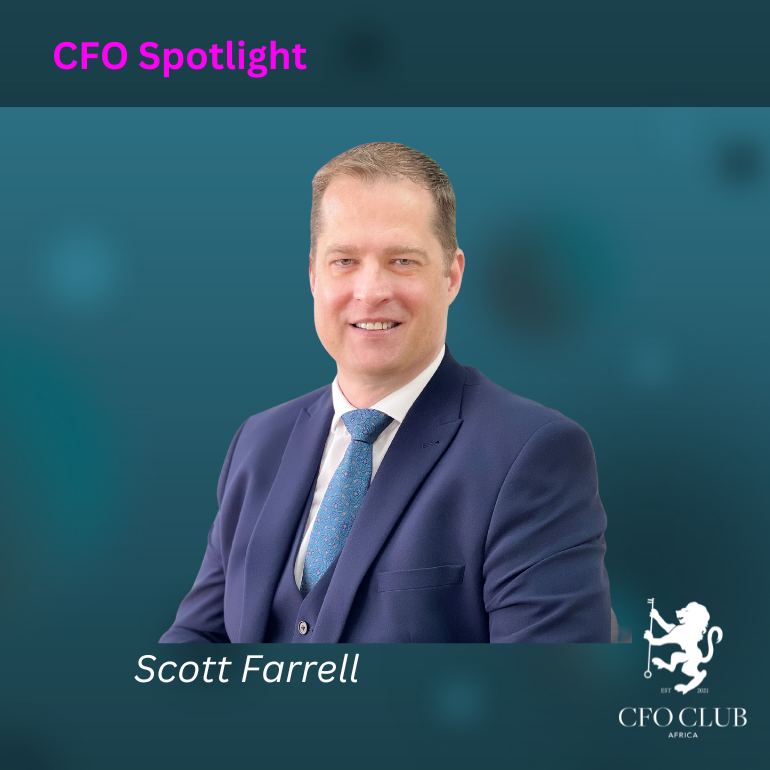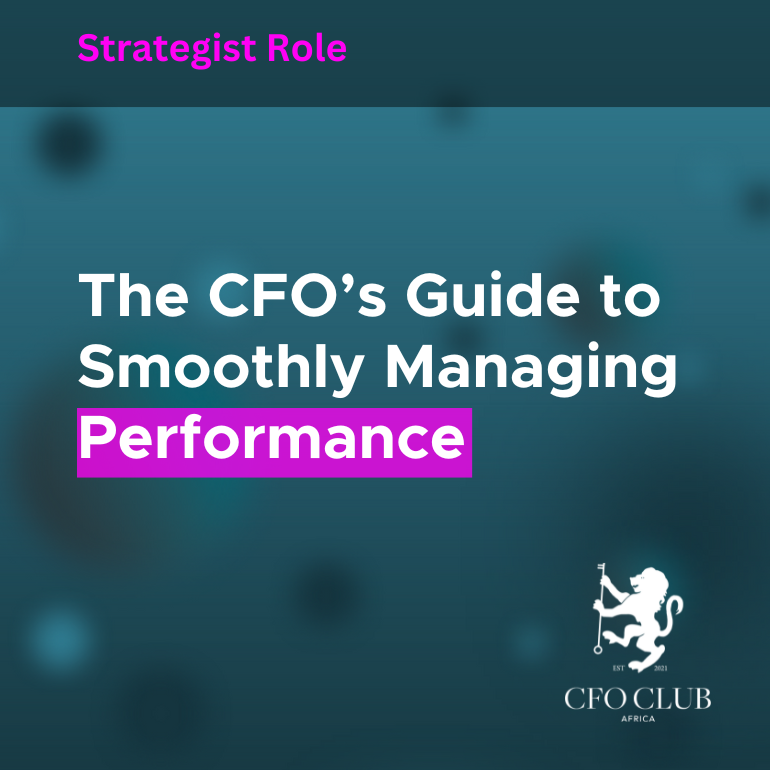From Boardroom to Broadcast: The CFO as Company Spokesperson
From Boardroom to Broadcast: The CFO as Company Spokesperson
For many years, the Chief Financial Officer was viewed as the quiet operator behind the scenes. They were known for their precision with spreadsheets, their cautious tone in meetings, and their largely invisible presence to the outside world. That view no longer applies. Today’s CFO is not just managing the finances of the business. They are managing how the business is seen.
In modern business, especially in South Africa, the CFO often becomes the most credible public figure within the organisation. When trust, investor confidence, and public scrutiny are at stake, the CFO frequently takes centre stage.
You Are Being Watched, and That Can Work in Your Favour
It is easy to assume that the CEO is the only public face of a company. However, ask any investor, analyst, or journalist who they pay the most attention to in earnings calls and public briefings, and many will say it is the CFO. That is because the CFO represents the truth. They are not spinning a message or promoting an idea. They are dealing with facts, forecasts, and risk.
In South Africa’s business environment, where public trust is fragile, regulatory compliance is non-negotiable, and financial transparency is a competitive advantage, the CFO plays a crucial role in shaping whether a company is seen as credible, ethical, and stable.
Credibility Depends on How You Communicate
One of the most valuable contributions a CFO can make to public perception is consistent, accurate, and honest communication. Financial reports, investor calls, public updates, and even interviews all feed into the broader narrative about a business. A CFO who speaks clearly, takes responsibility, and avoids vague responses can earn trust that advertising cannot.
This does not mean that the CFO must always paint a positive picture. On the contrary, credibility grows when a CFO can admit that performance is down, explain why, and walk stakeholders through the plan to recover. Investors and stakeholders remember how leaders act when things are not going well. In a country where financial scandals have damaged public trust, that type of openness is often what sets one company apart from the rest.
When CFOs use language that is evasive, filled with jargon, or overly technical, they risk being misunderstood. Worse, they may be viewed as hiding something. On the other hand, when they are practical, calm, and confident in their explanations, they signal leadership, not just competence.
Framing the Numbers Is Just as Important as Reporting Them
Numbers do not speak for themselves. Someone needs to give them meaning. That someone is the CFO.
Financial results are not just about earnings per share or cost ratios. They are about direction, strategy, and intent. A CFO helps stakeholders understand whether a drop in revenue signals a deeper problem or a deliberate investment in future growth. A spike in costs may mean poor control, or it may reflect new infrastructure being developed for long-term gain.
In this context, the CFO becomes the storyteller of the company’s financial strategy. In a country like South Africa, where market confidence can swing on a headline, this role is critical. A CFO who frames financial results with clarity, links them to broader goals, and avoids empty phrases provides a steady hand that the market rewards.
Ethical Conduct Is a Public Statement
The public does not judge a company only on its performance. It also judges whether the company is doing the right thing. This is where the CFO steps into the spotlight as the voice of ethics and governance.
When your company is asked about its ESG commitments, its compliance practices, or its response to a governance failure, it is the CFO who is often expected to speak with authority. This is not a technical requirement. It is a reputational responsibility. You are the one who signs off on disclosures. You are the one who decides what is material and what is not.
In recent years, particularly in post-scandal South Africa, public and institutional trust has shifted toward companies that show ethical leadership. That starts with you. The best CFOs do not just focus on clean audits. They focus on building cultures of accountability. They insist on transparency, even when it is uncomfortable. They protect whistle-blowers. They explain unpopular decisions. And in doing so, they tell the world that this is a company worth believing in.
The CFO Is the Anchor During a Crisis
No business is immune to crisis. Whether it is a cyberattack, a liquidity crunch, regulatory investigation, or reputational damage caused by a supplier, every organisation eventually faces a test.
In these moments, the CFO becomes the voice of reason. The CEO may provide the vision and the lawyers may advise on risk, but it is the CFO who is expected to present the facts, explain the financial implications, and outline the path forward. Public perception during and after a crisis is shaped not only by what happened, but by how it was explained and who explained it.
CFOs who step forward during difficult moments, take ownership, and show the way forward build reputations as trustworthy leaders. These reputations, built under pressure, often become long-term career assets.
Strategic Decisions Reflect on How the Company Is Seen
CFOs today are no longer passive participants in strategic planning. They are central to it. Every decision about where to invest, how to allocate capital, which projects to delay, and which technologies to adopt carries a message about what the company values.
When the CFO supports sustainability projects, drives digital transformation, or defends spending on staff development, they are telling the market that the company is forward-looking. When they cut waste, restructure liabilities, or improve working capital, they are showing that the business is disciplined and resilient.
These decisions may start on a spreadsheet, but they echo far beyond the finance team. For institutional investors, business partners, and future talent, the CFO’s judgement helps define the character of the organisation.
Internal Culture Is Part of Public Perception
One of the most overlooked aspects of the CFO’s influence is the way their internal actions shape the external image of the company.
If your finance team is efficient, responsive, and accurate, that reputation spreads quickly among suppliers, employees, and regulators. If your procurement processes are fair, if payroll is on time, and if compliance is well managed, then people talk about your company as being well run.
This internal consistency creates an external perception of reliability. It means that your company is not just trying to appear ethical or stable, but that it actually operates in that way every day.
What This Means for South African CFOs
In South Africa, where the memory of state capture is still fresh and where corporate governance is rightly under constant scrutiny, CFOs who lead with visibility and values will always have an edge.
If you are a member of the CFO Club, you are already part of a group that understands the real-world weight of the CFO role. You are not just responsible for the numbers. You are the guardian of trust, the communicator of strategy, and the voice people look to when the noise gets too loud.
Your technical skills have built your career. Your public presence will define your legacy.
So, the next time you sit down to prepare a report, lead a meeting, or speak to a stakeholder, remember this. You are not just presenting numbers. You are presenting the company. You are the face they trust when trust matters most.





